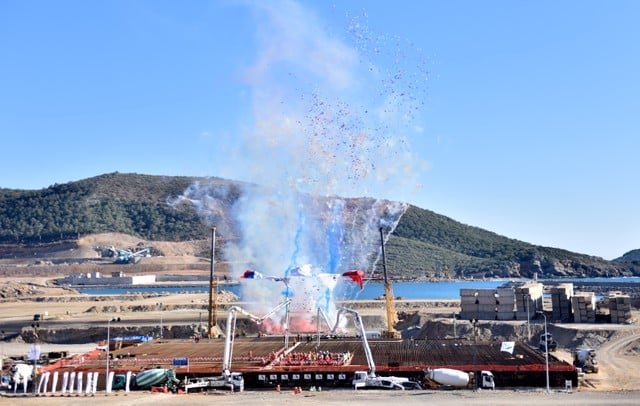Turkey’s aggressive and multi-faceted energy strategy is posing increasing challenges for Cyprus and the broader Eastern Mediterranean region, according to Andreas Poullikkas, professor of energy systems and former chairman of the Cyprus Energy Regulatory Authority.
“Turkey is pursuing a multidimensional energy policy with three strategic goals,” Poullikkas explained. “First, to enhance its energy autonomy. Second, to establish itself as a regional energy hub. And third, to project geopolitical power through energy leverage.”
According to Poullikkas, Ankara’s approach combines major investments in renewables and nuclear power with a robust natural gas pipeline network drawing on Russian and Azeri sources.
At the same time, Turkey is “systematically interfering with the exploration and drilling activities of other states in the Eastern Mediterranean,” shifting the regional agenda away from cooperation and towards crisis management, he said.
“Turkey’s legal and policy framework rests on three pillars,” he stated. “These are a drastic reduction in energy imports, rapid development of domestic energy resources (particularly renewables and nuclear) and the creation of a secure and predictable energy market.”
He highlighted that Turkey aims to cut natural gas imports to 18.9 per cent by 2025 and install 52.9 gigawatts of solar and 29.6 gigawatts of wind power by 2035. Additionally, the Akkuyu nuclear plant is expected to add 7.2 gigawatts of capacity by 2028.
“The country’s first climate legislation also includes the establishment of a national emissions trading system, a carbon tax, and a long-term target of climate neutrality by 2053,” he said.
Turkey is also fortifying its gas infrastructure through regional pipelines. “The TurkStream pipeline has been delivering Russian gas to Turkey and parts of Europe since 2020, while TANAP serves as the backbone of the Southern Gas Corridor,” Poullikkas explained. Furthermore, the Sakarya gas field in the Black Sea is projected to meet 30 per cent of household gas needs in Turkey by 2026.
He said Turkey has made “impressive gains” in renewable energy. “Solar capacity more than doubled in just two and a half years to reach 19.6 gigawatts, saving the country approximately 15 billion dollars in gas imports. Annual renewable energy auctions of 2 gigawatts post-2025 support Turkey’s target of 64.7 per cent renewable installed capacity by 2035.”
Yet Ankara’s energy ambitions are not purely economic, according to Poullikkas. “Turkey is clearly using energy as a tool of geopolitical influence,” he warned.
“Through its ‘Blue Homeland’ doctrine, it seeks to control vast maritime zones in the Eastern Mediterranean and the Aegean, disregarding the United Nations Convention on the Law of the Sea (UNCLOS), which it has not ratified,” he added.
“In this context, Turkey applies military pressure and intervenes in the exploration and drilling activities of the Republic of Cyprus and Greece,” Poullikkas said. “It also signs controversial bilateral agreements, such as the Turkish-Libyan memorandum, which bypasses the rights of Greek islands and provokes tensions with the EU and neighbouring states.”
Turkey supports the claims of the unrecognised Turkish Cypriot entity and demands joint exploitation of hydrocarbons within Cyprus’ Exclusive Economic Zone, he added. “At the same time, it carries out large-scale military exercises and naval deployments as a means of asserting control over contested maritime zones,” Poullikkas said.
“These aggressive tactics escalate tensions, drive up defence spending among coastal states, accelerate new alliances such as the Greece–Cyprus–Israel trilateral partnerships, and strengthen rival energy centres like Egypt,” he said.
Cyprus, meanwhile, remains “under sustained challenge,” he warned. “Turkey continues to conduct seismic surveys and drilling in Cyprus’ EEZ, allegedly on behalf of the Turkish Cypriot community. It is also actively obstructing the island’s planned electrical interconnection with the EU system.”
Despite this, Poullikkas said Cyprus is advancing its energy agenda “methodically.” “It is seeking mutually beneficial partnerships with European and regional players,” he said. “Cyprus aims to gradually integrate its natural gas into the European transmission network and to create electrical interconnections to overcome its energy isolation.”
Currently, Cyprus is the only EU member state not electrically interconnected with other countries. “This has led to significant derogations from EU rules, which affect market operations, regulatory oversight, and balancing mechanisms,” he explained. “The island’s geographic isolation prevents full participation in the EU’s internal electricity market.”
Nevertheless, he stressed that initiatives such as the Greece–Cyprus–Israel (GSI) electricity interconnector could be transformative. “Once these interconnections are completed, Cyprus will no longer qualify for such derogations and must fully implement EU legislation,” Poullikkas said.
“This will bring enormous benefits to both consumers and sustainability,” he added. “Consumers will have access to a wider choice of suppliers, grid reliability will improve, and clean energy flows will increase in both directions.”
The geopolitical significance of these projects is equally crucial. “Cyprus will become a transit and connectivity hub,” Poullikkas said.
“Both through the GSI project and emerging initiatives like the India–Middle East–Europe Corridor (IMEC), the island is strategically positioned to store and transmit energy to the EU’s southeastern gateway,” he added.
“This evolution benefits not only consumers, but also the EU’s broader energy security,” he said. “Faced with Turkish provocations, Europe needs reliable, sustainable alternatives.”
“Lasting peace and stability in the region,” he concluded, “can only be achieved through adherence to international law, dialogue on maritime zone delimitation, and the creation of shared infrastructure that strengthens the energy ecosystem of the Eastern Mediterranean.”
Poullikkas called for “a coordinated and assertive EU intervention” to counter Turkish obstruction. “Europe must support the development of Cyprus’ gas resources and strategic interconnections like the GSI project,” he urged.
“This is not only a question of energy, but of defending the fundamental principles of EU sovereignty and rights,” he concluded.

